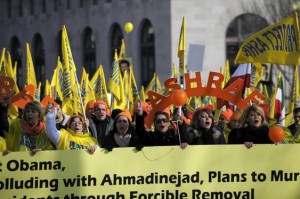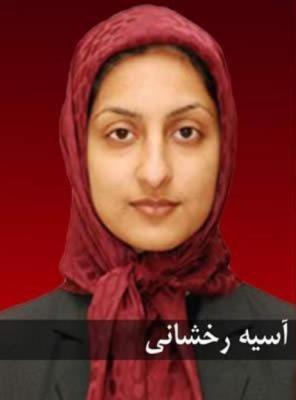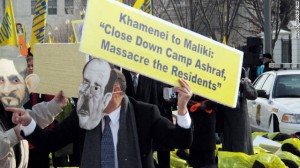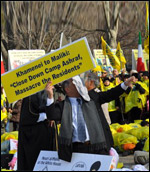PRNewswire

Iranian-Americans participate in a rally outside the White House to support the protection of Camp Ashraf in Iraq, which houses 3,400 members of the Iranian opposition party, MEK. The event was planned to coincide with Iraqi Prime Minister Nouri al-Maliki's visit with President Barack Obama on December 12, 2011. (Erin Sutherland/MCT via Getty Images)
WASHINGTON, Dec. 15, 2011 /PRNewswire-USNewswire/ — The US Committee for Camp Ashraf Residents (USCCAR) deplores Washington Post’s editorial (“A U.S. plan to save Iranians who remain in Iraq”, Dec. 14), endorsing a US plan for relocation of 3,400 residents of Camp Ashraf to an Iraqi-run de facto detention center near Baghdad’s International airport, formerly known as Camp Liberty.
The insidious piece, replete with double-entendre and mixing of absolutely no facts and lots of fiction, is effectively a farewell gift to Iraqi Prime Minister Nouri al-Maliki, on his way back to Baghdad, to set in motion the plan for the massacre of Camp Ashraf residents. The Post is suggesting to have the lives of these Iranians under the control of Maliki, a man, who David Ignatius of the Post has described as “the conspirator turned chief executive” and a “backroom plotter,” whose “own Dawa Party bombed the U.S. Embassy in Kuwait in 1983.”
The editorial’s case about relocation of the residents to such a detention center as the best plan to end this humanitarian crisis peacefully is at best wishful thinking. It is an extremely dangerous suggestion that could prepare the ground for yet another Srebrenica-style massacre. Without any practical and actionable guarantees by the international community, nothing would deter the Iraqi forces of al-Maliki from repeating the massacres they perpetrated in July 2009 and April 2011, killing 47 residents – including eight women – and wounding 1070. To cover its bloody tracks, the Iraqi government, with the help of the US Embassy, has blocked any investigation into these crimes – as UN had demanded – by the US and European Union parliamentary fact-finding missions.
In light of these killings and the three-year illegal and barbaric siege of Camp Ashraf, the Post’s blindness to volume of facts all pointing to Iraq’s systematic and deliberate breach of its commitment toward Ashraf residents, and to the equally abhorring United States’ inaction in the face of Iraq’s repeated violation of its so-called written assurances to the United States, is ominously suspect.
Astonishingly, in line with Iran’s thirty-year-old policy of blaming the MEK’s leadership for whatever atrocities Iran’s ruling tyrants have committed against the organization – a ploy widely used by Maliki following the July 2009 and April 2011 attacks – the Post’s editorial, in an ultimate act of falsification, sinisterly attempts to shift the blame for an impending massacre away from Maliki – and by extension from the Obama administration – to MEK’s leadership, accusing it of making “unrealistic demands.” We must repeat to the Post the following facts:
• Camp Ashraf residents were recognized by the United States as protected persons under the Fourth Geneva Convention and as such the US provided them protection until January 2009. According to article 45 of the Convention, that responsibility does not elapse if the new protecting power (Iraq since 2009) does not have the capacity and the intent to provide protection. Iraq has failed on both fronts and thus from a legal standpoint the United States, as the original protecting power, is still bound to ensure the residents’ protection whether or not it has a presence in Iraq.
• In 2003 and again in 2004, the United States gave written guaranteed commitment of protection to every individual in Ashraf as long as they remain in Iraq. America is, therefore, still morally and legally responsible for their safety and security.
• Last September, the UN High Commissioner for Refugees (UNHCR) declared that Camp Ashraf residents have applied for refugee status and therefore, under international law as “asylum seekers” they must be able to benefit from basic protection of their security and well-being.
Against this background, the demand by Camp Ashraf residents and its leadership that “U.S. troops or U.N. peacekeeping forces provide security at the new camp,” is indeed completely “realistic” and in line with America’s promises and UNHCR’s declaration.
If the Post’s editorial finds the residents’ morally and legally justified and actionable demand “unrealistic,” then it is acting as a de facto voice of an administration that is dishonoring America by reneging on its commitment to a group of unarmed men, women and children, who in the words of Brig. Gen. David Phillips, former Commandant of U.S. Army Military Police Corps and former Senior Commanding Officer at Camp Ashraf, were vetted and completely investigated by several US agencies which were not able to find an iota of evidence linking any of them to any act of violence.
Furthermore, the Washington Post shamelessly refers to some of the most patriotic Americans as a “stable of handsomely-paid” mouthpieces of the MEK. This is astonishing as the paper itself has never wasted any time to support the misguided policy of the US State Department to designate the MEK as a terrorist organization in 1997 for purely political considerations and appeasement of the mullahs of Tehran. The designation, legally and factually discredited and revoked in the United Kingdom, France, and the European Union, and declared unconstitutional by the U.S. Federal Court of Appeals as it violated the due process rights of the MEK, has been used by the Maliki government as a pretext to slaughter the residents.
Additionally, the editorial alleges that the MEK was responsible for killing Americans more than four decades ago when multiple credible independent sources have provided ample countervailing evidence that the current MEK in its entirety has had nothing to do with it.
The Washington Post is wise to remember that history may not judge kindly its expediency in support of an administration that seeks reelection by throwing a group of innocent men and 1,000 Muslim women, who have already been victimized by the barbarism of Iraqi soldiers, into the wolves. Unfortunately, in this case of the impending humanitarian catastrophe of monumental dimension, the Post has opted to take the wrong side and has issued a license to murder the residents by blaming the victims instead of the butchers.
SOURCE: US Committee for Camp Ashraf Residents (USCCAR)


